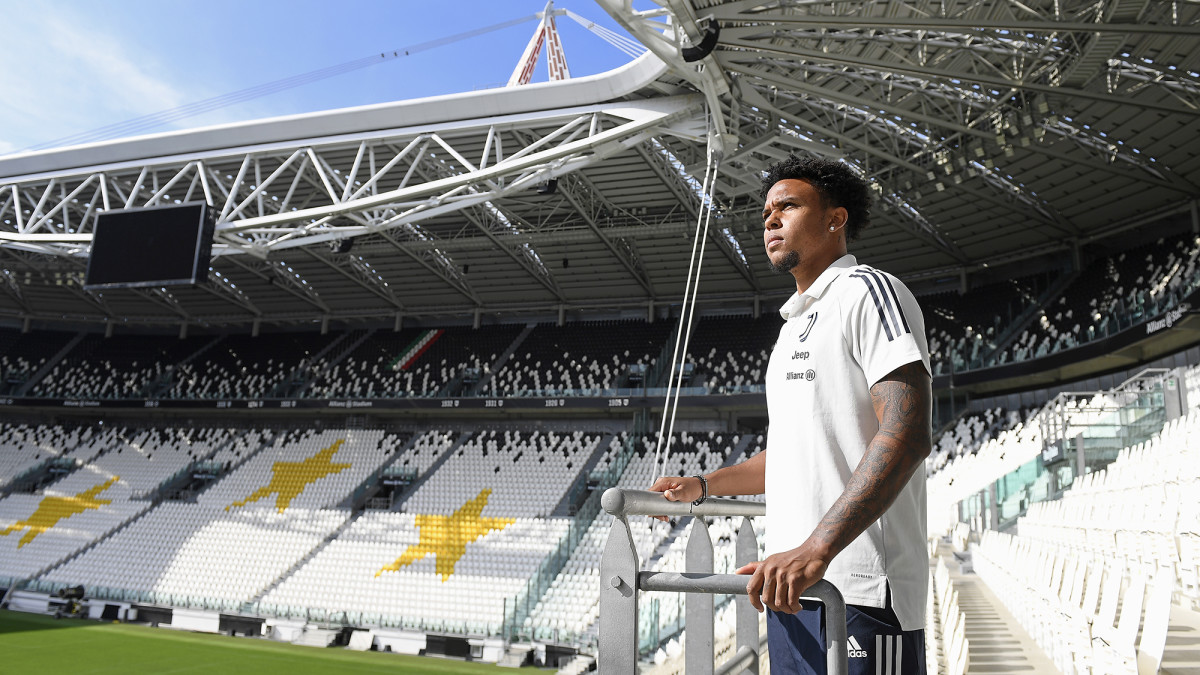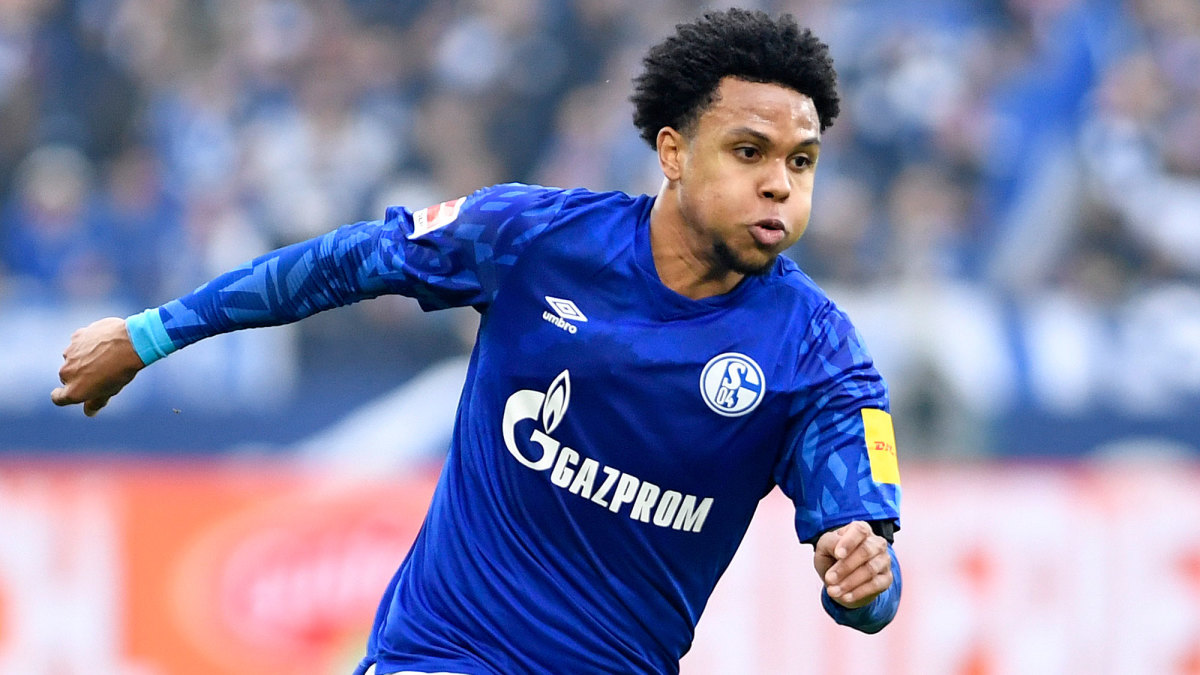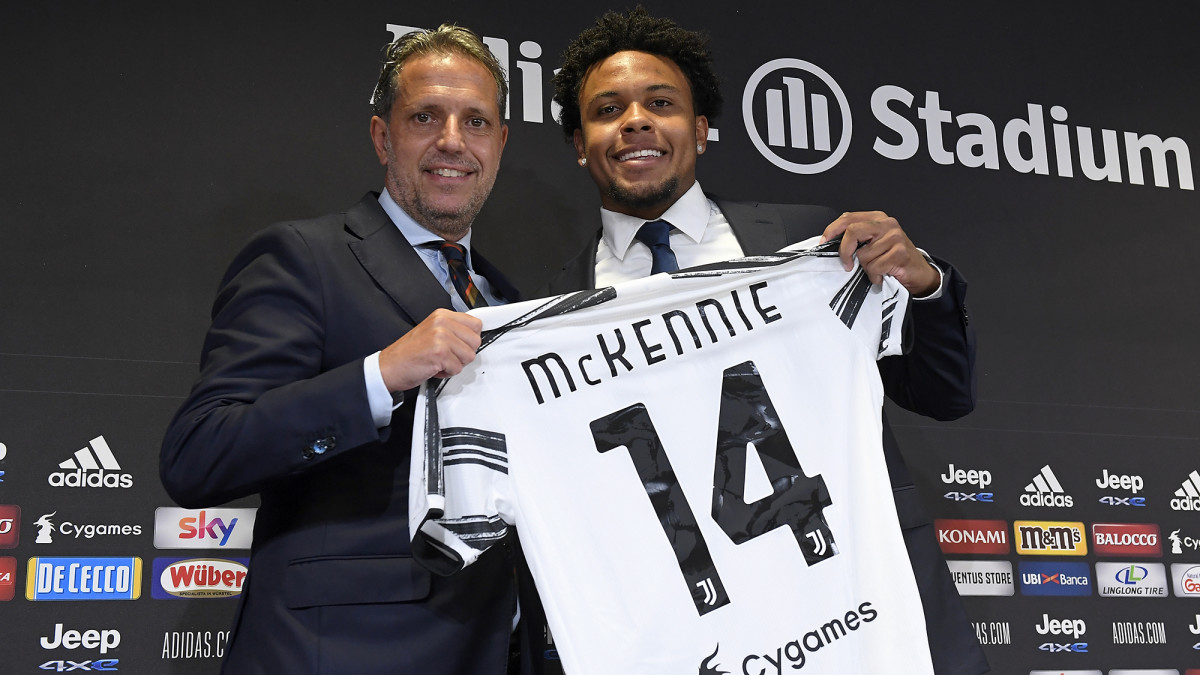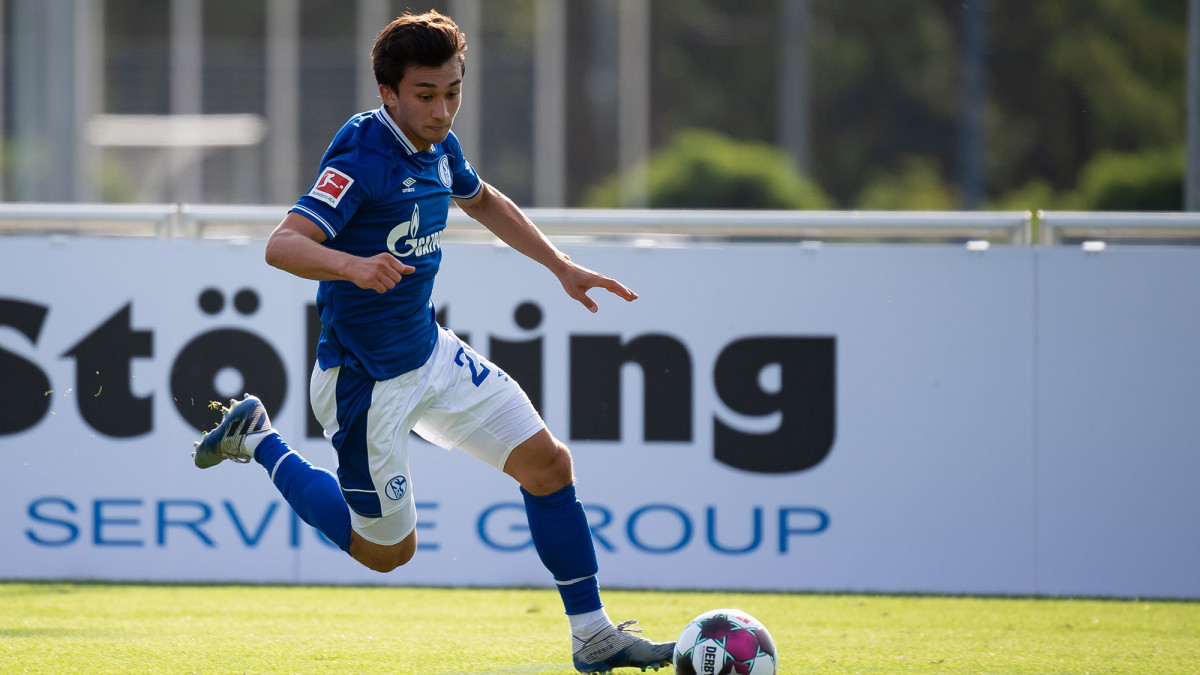How Juventus Entered and Won the Weston McKennie Race, and Schalke's Next Americans
Imagine a storm at sea, with waves and fierce winds. You’re a big boat. Not a speedboat or a kayak, but something like a commercial fishing trawler, a clipper ship or Roman Abramovich’s latest superyacht. You’ll get tossed about. You’ll have to prepare for the storm and make some accommodations, and you’ll probably take on some water. You’re worried there might be a bit of damage once it’s all over, but you’re not worried about survival.
Now imagine you’re an aircraft carrier.
On the water, there are big boats, and there are Big Boats. In soccer, there are big clubs and Big Clubs. And those who follow or work in the sport are well aware of the differences. Schalke 04 is a big club. Hailing from the football-crazy Ruhr region of western Germany, Schalke packed around 62,000 fans per game into the Veltins-Arena, pre-pandemic. It ranked among the world’s top 10 in average attendance. Schalke has won domestic and European trophies and according to Deloitte’s annual Football Money League report, it’s the 15th wealthiest team on the planet with 2018-19 revenue exceeding $380 million.
But it’s taken on water. The lack of match-day revenue since the Bundesliga shut down temporarily in early March, plus Schalke’s failure to qualify for the UEFA Champions League in four of the past five seasons (not to mention that 2020-21 will be the third in four without European football of any kind), has hit the bottom line hard. Chairman Clemens Tönnies resigned at the end of June.
“I wouldn’t say we are a rich club right now, but we are still one of the biggest clubs in Europe when we talk about members, when we talk about fan base, when we talk about spectators home or away,” said Jochen Schneider, Schalke’s director of sport.
“But if you don’t have access to the European money which you get for participating in UEFA competitions, then it's going to be a problem in a mid-term perspective,” he told Sports Illustrated. “This club is used to playing European football and the size of the club, the number of employees, the wages we pay to players—everything needs European football. And as we haven’t qualified three out of four times, we have to face reality now, and this in combination with the COVID-19 pandemic made the situation so tough for us.”
This is how Weston McKennie, a 22-year-old midfielder with three Bundesliga seasons already under his belt, wound up becoming the first American to sign with mighty Juventus. Juventus is a Big Club. It’s an aircraft carrier.

While Juve was cruising to a ninth consecutive Serie A championship, Schalke was battered following the May restart. It went winless across nine Bundesliga games, sliding out of the European places and into the bottom half of the table. Schneider and his staff calculated that the club had to sell at least one high-value player, “to close the delta when you think about our budget”—the sort of player you wouldn’t part with during sunnier times. According to Transfermarkt, Schalke fielded four men worth at least €18 million. Among them, it was McKennie, the FC Dallas product, who attracted the most interest.
“Since the restart of the Bundesliga, he was by far the best player [at Schalke] and in certain matches, by himself he was carrying the team,” said Schneider, who spent more than three years at Red Bull before arriving in Gelsenkirchen.
“When we extended Weston’s contract just one year ago, we didn’t expect him leaving in the summer of 2020,” Schneider explained. “When we didn’t qualify for Europe, plus COVID, that brought us to the decision that we had to sell one player. We communicated that quite openly and that’s why other clubs approached us and said, ‘Listen, we would be interested to sign Weston McKennie.’”
Why McKennie?
“It’s a combination of many reasons,” Schneider said. “First of all, he’s a great football player. He’s still a young kid. He just turned 22. He’s an American international. He’s a warrior on the pitch, and every day he brings so much positive energy into the dressing room. He’s a smart guy. So there are many reasons why Weston was such an attractive target.”
We’re now used to seeing American players move to Europe and move within Europe. Once there, a select few have taken a significant step up in competitive level. In recent years, both Michael Bradley (from Chievo Verona to AS Roma) and Clint Dempsey (from Fulham to Tottenham Hotspur) moved from teams happy to avoid relegation to teams targeting the Champions League. They were later in their careers, however. Christian Pulisic’s $73 million move from Borussia Dortmund to Chelsea set a new bar, not only in value but in terms of a Big Club’s recognition of potential in a young American player.
But Pulisic’s Big Club pedigree wasn’t in doubt by the time he was sold early last year. McKennie’s was up for discussion. And when Schalke first put up the “For Sale” sign–its season concluded at the end of June—it looked like the American’s most likely move was a lateral one.
Hertha Berlin was interested. One could make a case that a move to Hertha might represent a small step up considering Schalke’s current financial situation, but the capital club is hardly a European heavyweight. It hasn’t qualified for the Champions League in two decades and finished just two points above Schalke last season.
“But if I could choose between a German club and a foreign club, I would prefer the foreign club, because then he’s not playing in your league. He’s not playing against you twice a year. I think this is something normal,” Schneider said. "But we would’ve also found an agreement with a German club if that’s where he wanted to go.”

Schneider wouldn’t confirm the identity of McKennie’s other suitors, but Sports Illustrated understands that Southampton initially was the most interested team beyond German borders. Top to bottom, the Premier League is more competitive than the Bundesliga and its players perform under a brighter global spotlight. Again, one could argue that a transfer to St. Mary’s would be a small step up. But Southampton still is as likely to be relegated as it is to qualify for the Europa League. Other clubs reportedly floated to the surface, including AS Monaco and Liverpool. Schneider did confirm he wasn’t contacted by the latter.
Then came the call. It was mid-August, and Juve’s first point of contact was Michael Reschke, the Schalke technical director who previously had dealt with the Italian club while working for Bayern Munich.
“They have known each other for a long time, so they called Michael and they were asking if there would be a possibility to get Weston. This is how we got in contact,” Schneider said.
The conditions and calculus changed, and reports filtering out of Italy and Germany that Juventus was interested in McKennie were met with surprise—not because McKennie didn’t warrant the attention, but because the Bianconeri hadn’t shown much interest in American players before. This would be a massive step up. Juve is a giant of the global game, a tradition-rich club that’s been home to a litany of renowned players and which now features the sport’s greatest attention magnet, Cristiano Ronaldo. Moreover, it’s obsessed with winning the Champions League. Juve’s last continental triumph came back in 1996, and its recent run of unprecedented domestic dominance has led to just two runner-up finishes.
“Overall we negotiated with two other clubs, one German club and one Premier League club. But when Juventus showed up, this is probably one of the top six clubs in the world. Weston was just so keen to go to such a huge club,” Schneider said. “When we are on the path to make a decision like this, it’s always about the development of the player and the development of the club. If the player’s development is faster than the club’s development, which it was in Weston’s case in the past two years, and a big club like Juventus is knocking on our door, we have to talk to them. And as far as we can find a reasonable solution for the club money-wise, then it’s just fair and necessary to not stand in the players way to move.”
McKennie FaceTimed with new Juventus manager Andrea Pirlo and told Schneider that he found the World Cup winner and former Juve (and New York City FC) midfielder “quite impressive.” And McKennie didn’t feel like he’d be moving to Turin to sit on the bench. If anything, Juventus has been shedding some midfield age and salary this offseason, sending 30-year-old midfielder Miralem Pjanić to Barcelona (with Arthur Melo coming the other way) and 33-year-old Blaise Matuidi to MLS expansion team Inter Miami.
With McKennie’s interest obvious, negotiations began.
“We talk to the player. ‘Are you ready for this step?’ If he says ‘Yes,’ and we find an agreement with the club which also helps our club, money-wise, then I think it’s time to let the player go,” Schneider said. “Then we have to bring the next one in and give this player a chance to develop like Weston did. This is part of our philosophy. There are not so many big clubs in the world and Juventus is certainly one of those, and it’s tough to say to a player, ‘No you cannot go to Juventus.’ If they would’ve come with a ridiculous offer we would’ve said ‘No,’ but at the end of the day it was a good agreement for all parties.”
The agreement was complex, as it included a one-year loan and terms that gave Juventus the option, or even the obligation, to purchase McKennie’s rights outright. The loan fee is €4.5 million ($5.3 million), and at the end of the 2020-21 season, Juventus can make the move permanent with an additional minimum of €18.5 million ($21.9 million). But that second figure could rise to as high as €25.5 million ($30.2 million) if McKennie and/or the club hit certain benchmarks. There’s also at least one milestone that would obligate Juventus to buy: if McKennie appears in at least 60% of its games this season, according to a Sky Sports report. The loan appears to spread out the payments in a manner more palatable to Juventus, but likely means more money for Schalke in the long run.
Schneider said that he expects Juventus to keep McKennie beyond this season, but that if something unanticipated occurred and he was returned to Gelsenkirchen, the American would be received with open arms.
“We would be more than happy to have him back here. He still has three years on his contract. He’s still a great player—still a fantastic person. It’s going to be a win-win situation. If he stays there permanently or if he will come back. But I think he will not return to Schalke next summer,” Schneider said. “I wouldn’t call [the loan] a trial. That’s not the perfect description. I know that they see a long-term investment in him and that Juventus, they don’t want to keep him just for one year. This was clear.”
Schneider and Schalke clearly wish conditions were different. But sometimes those conditions separate the big clubs from the Big Clubs, and in the end McKennie’s transfer was the best move for the long term.
“Before COVID, I would not have sold him for this amount of money. But in this very difficult transfer market, it was O.K. To be honest, it was O.K.,” Schneider acknowledged.

McKennie was unveiled on Monday and, showing off the smarts that Schneider mentioned, savvily opened his press conference with a bit of Italian. He posed for photos and took a walk on the Allianz Stadium field, busting through a barrier with each step or shutter click. Beyond Barcelona and Real Madrid, Juventus is arguably the most famous European team that’s never featured an American. It took one unexpected phone call to Germany last month to set significant change in motion.
“It is a great honor to be the first American player in the history of Juventus," McKennie said Monday. "Having the opportunity to wear this shirt, representing my country and bringing young Americans closer to football makes me proud.”
He added, “There was no need to convince me to come to Juventus, because being here is a dream that has become a reality.”
Juventus opens its Serie A season on Sept. 20 against Sampdoria.
Back at Schalke, the process Schneider described—“to bring the next one in”—continues. The club must ride out this storm. It isn’t expected to qualify for Europe. It is expected to extend its current three-decade run in Germany’s top tier and to that end, it signed free-agent striker Vedad Ibišević from Hertha. There’s a U.S. connection there—Ibišević went to high school and college in St. Louis. As for the rest of the current transfer window, there’s still almost a month remaining. But any moves will be modest, as Schalke seeks to promote from within. And that’s where stronger American ties can be found.
Like Fulham, Schalke doesn’t necessarily seek out U.S. players. But the organization does have faith in them. It doesn’t hurt that head coach David Wagner, although born in Germany, played for the USA in the late 1990s. Schalke also has big belief in its academy, which is renowned for producing players like Manuel Neuer, Julian Draxler, Benedikt Höwedes, Leroy Sané and Thilo Kehrer, among others.
“I would say we have the best academy in Germany. We probably have the best under-19 coach in Europe, Norbert Elgert,” Schneider said. “I could name 20 top-class players who have been developed by Norbert, and this is a big advantage we have.”
The next American graduate of that academy is Nick Taitague, a 21-year-old attacking midfielder/winger from the Richmond, Va., area who has earned promotion to Schalke’s first team after three years at the club. Taitague has had injury issues, but he’s become healthier and stronger and should be ready for Bundesliga minutes, Schneider said.

“We just extended his contract this summer [for one season with two option years]. He went through a hard time being injured and was out for such a long time, but he’s in a good way now, working hard with the athletic coaches. They’re in a good process to make him match-fit, so that he will be able to play on this level,” Schneider said. “He’s still young. When you look into his face, he looks like he’s 16 or 17. He’s not the tallest one. But he has a great spirit and is hardworking and we are quite optimistic that he will play a good season, and that he can make an impact on our game.”
Behind Taitague is striker Matthew Hoppe, a 19-year-old from Orange County, Calif., who chose Schalke over playing college soccer at San Diego State. He scored five goals in 20 appearances for Schalke’s U-19 team last season and now has been moved up to the reserve side that plays in Germany’s fourth tier. Another American, Evan Rotundo, signed with the club this summer and will start with the U-17s. He’s an attacking midfielder from San Diego.
“I think the academies of the American clubs are getting better and better, and the young American kids are really well developed when they come over—technically especially, not as much in tactics,” Schneider said. “But the technical skills are really good, and then the spirit is—I’ve known a few American players, also Tyler Adams from Leipzig when he played for New York—the spirit of those players is just amazing. This is what helps them a lot when they come to Europe at such a young age.”
They have spirit, and now they have proof of concept. There are Americans aged 22 or younger at RB Leipzig, a Champions League semifinalist, and former winners Ajax and Chelsea. There’s a 19-year-old from South Florida, Konrad de la Fuente, at Barcelona B. And now, improbably, there’s a U.S. international at Juventus. The game is changing. The Big Clubs are now welcoming Americans aboard.
